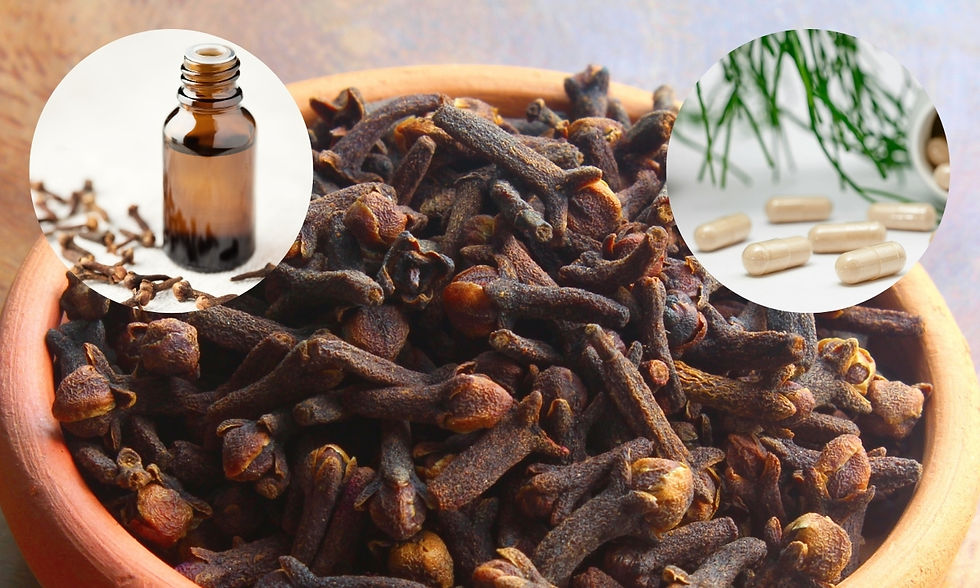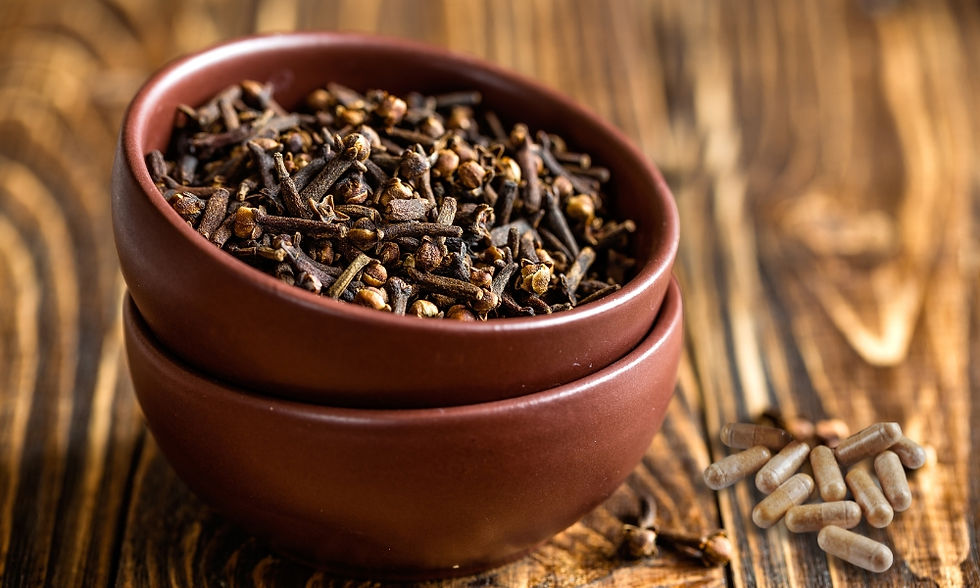Clove for Digestive Wellness: Why It's in Every Herbalist’s Toolkit
- Herbs around us
- Sep 11, 2025
- 6 min read
Updated: Oct 1, 2025
If you’ve ever sipped on a spicy herbal tea after a heavy meal or reached for an all-natural gut remedy, there’s a good chance clove was one of the ingredients working behind the scenes. Long revered in Ayurvedic and traditional medicine, clove is not just a warming spice—it’s a potent herbal ally for digestive health. From relieving bloating to enhancing enzymatic function, this tiny bud has earned its place in herbal medicine cabinets around the world. But why does it work so well? Let’s explore what makes clove an essential ingredient in digestive support.

Image: Canva
How Clove Works: A Quick Overview of Its Active Compounds
Clove’s medicinal value is largely credited to its rich content of eugenol, a potent phytochemical that functions as both an antioxidant and antimicrobial agent. Other constituents such as beta-caryophyllene, gallic acid, and tannins also contribute to its therapeutic effects.
In essential oil form, clove delivers a highly concentrated dose of eugenol, often exceeding 70–80% of its composition. Capsules, on the other hand, typically contain clove powder or standardized extract, offering a more moderate but controlled release of active ingredients into the digestive system.
Understanding these chemical differences is key to matching the form of clove with your health goals.
How Clove Supports Digestive Health
Clove, or Syzygium aromaticum, contains a powerful compound called eugenol, which is largely responsible for its health benefits. Eugenol acts as a carminative (relieves gas), antispasmodic (reduces intestinal cramping), and anti-inflammatory—three properties that make clove particularly valuable when it comes to the digestive system. These effects have been confirmed in both traditional knowledge and modern research, offering a solid bridge between ancient wisdom and scientific evidence.
1. Reduces Bloating and Gas Naturally
One of clove’s most immediate benefits is its ability to ease bloating and abdominal discomfort. Traditional herbalists often recommend chewing a clove or drinking clove tea after meals to reduce the feeling of fullness. This is because clove promotes the expulsion of gas and reduces fermentation in the gut, making it ideal for anyone prone to indigestion.
Modern studies have supported this use: a 2019 review in the Journal of Traditional and Complementary Medicine noted that clove stimulates digestive secretions and improves intestinal motility, helping the gut process food more efficiently. For many individuals struggling with food sluggishness or occasional discomfort, clove offers a safe and gentle solution.
2. Enhances Digestive Enzyme Activity
Digestive enzymes are critical for breaking down food and absorbing nutrients. Clove appears to stimulate the secretion of saliva, gastric juices, and bile, which enhances nutrient breakdown and absorption. This makes it especially beneficial when consumed alongside rich or high-fat meals that tend to burden the digestive system.
Animal studies published in Phytotherapy Research have demonstrated increased enzyme levels in the presence of clove extract. While human studies are ongoing, herbalists already incorporate clove in multi-herb digestive blends specifically for this purpose.
3. Calms Nausea and Upset Stomach
Clove has long been used as a remedy for queasiness, especially in traditional Chinese and Indian medicine. It is known for its warming, grounding nature, which can help counteract cold or damp conditions in the stomach that may cause nausea. Whether inhaled as oil or taken as tea or capsules, clove often brings quick relief.
Pregnant women (under physician supervision) and travelers have historically used clove tea or clove lozenges for motion sickness. Its mild numbing and calming effects also make it useful in formulations for morning sickness.
4. Supports Gut Flora and Antimicrobial Balance
Clove's antimicrobial properties, largely attributed to eugenol, make it helpful in maintaining a healthy gut microbiome. It works selectively—supporting good bacteria while suppressing the overgrowth of harmful pathogens like Candida albicans or E. coli. This balancing effect is why clove is often included in herbal parasite cleanse formulas and post-antibiotic gut recovery blends.
In 2020, Frontiers in Microbiology published findings on how clove extracts could inhibit the growth of multiple intestinal pathogens without harming beneficial microbes. This points to its future promise in microbiome-focused therapies.
Clove’s Role in Gut Microbiome Balance
Emerging research suggests that clove extract may help regulate the gut microbiota by targeting harmful pathogens while leaving beneficial bacteria intact. This selective antimicrobial action is critical because the gut microbiome is not just about digestion—it influences immunity, mood, and even metabolic health.
In particular, eugenol, the dominant compound in clove buds, has demonstrated the ability to reduce populations of Candida albicans and E. coli in laboratory settings. These microbes are often linked to gut dysbiosis and bloating. A study published in Frontiers in Microbiology (2020) confirmed that clove extract inhibited the formation of pathogenic biofilms without disturbing the diversity of beneficial gut flora.
For those struggling with irregular digestion, IBS symptoms, or bloating, a clove supplement may offer subtle but sustained relief by enhancing gut flora resilience. However, more clinical trials are needed to understand the long-term impact of cloves on human gut microbiota.
Anti-Inflammatory Power in the Digestive Tract
Chronic inflammation in the gut is often at the root of digestive discomfort, food sensitivities, and autoimmune flare-ups. Clove’s natural anti-inflammatory action helps calm these underlying issues.
In one randomized clinical trial (Phytotherapy Research, 2018), patients who consumed a polyherbal formula containing clove oil reported significantly reduced abdominal discomfort and inflammation markers. Eugenol’s ability to block prostaglandin synthesis—similar to non-steroidal anti-inflammatory drugs (NSAIDs)—makes it a standout botanical for reducing gut irritation without side effects.
Beyond eugenol, cloves also contain kaempferol, quercetin, and gallic acid—polyphenols known for supporting intestinal lining integrity. These compounds may help protect against leaky gut and related immune responses.
Clove in Parasite Cleansing Protocols
Cloves have been used for intestinal parasite cleansing for centuries in Ayurvedic and Unani medicine. In modern protocols, clove supplements are often combined with wormwood and black walnut to support natural detox cycles.
What makes cloves particularly effective? Unlike many herbs that paralyze adult parasites, clove extract targets parasite eggs, interrupting their life cycle and preventing re-infestation. This makes clove a powerful ally during parasite cleanse regimens.
A 2019 study in Journal of Ethnopharmacology showed clove oil exerted larvicidal effects against Ascaris lumbricoides, a common roundworm. In another in vitro study, clove tincture demonstrated strong anti-protozoal activity against Giardia lamblia, with fewer side effects than synthetic drugs.
While overuse or high doses are not recommended without practitioner guidance, organic clove capsules or clove oil pills (enteric-coated) are increasingly included in seasonal detox or travel-prep regimens.
Real-World Benefits of Clove Capsules
For consumers looking to avoid the strong taste of clove tea or oils, clove supplement capsules offer a practical solution. These capsules are often:
Standardized for eugenol content
Vegan-friendly and organic
Easier to dose consistently
Free of synthetic additives
The rise in clove supplement reviews on Amazon and U.S. wellness forums reflects growing consumer interest. Many users report improvements in bloating, gas relief, stool regularity, and fewer sugar cravings after 2–3 weeks of use.
It’s important to choose trusted manufactured clove supplements that meet GMP standards, and where possible, opt for formulas with clove extract for more potency per serving.
Suggested Use and Pairing Tips
Here’s how to safely and effectively incorporate cloves into a daily digestive support plan:
Timing: Take clove supplements with meals to support digestion.
Stacking: Combine with ginger, black cumin seed, cardamom, or black pepper for synergistic gut benefits.
Dosage: Follow manufacturer guidelines—typically 500-750 mg/day for general digestive support, or up to 1,000 mg/day for short-term cleansing.
Always consult a healthcare provider if you are pregnant, breastfeeding, or managing chronic gut conditions.
Feature | Clove Powder | Clove Oil Capsules | Clove Extract (Standardized) |
Primary Compound | Eugenol (low %) | Eugenol (medium %) | Eugenol (high %) |
Best For | Culinary & DIY blends | Daily gut & immunity use | Therapeutic, targeted support |
Taste / Aroma | Strong, spicy flavor | Mild or enteric-coated | Neutral (encapsulated) |
Ease of Use | Moderate (measuring) | Easy | Easy |
Bioavailability | Low | Medium | High |
A Time-Tested Herb With Modern Science to Match
The ancient spice that once sparked global trade wars is now being embraced by a new generation for its digestive, immune, and anti-parasitic benefits. Whether taken as organic clove capsules, brewed into tea, or blended into detox protocols, this humble bud offers profound support for daily gut wellness.
As always, personalization is key. Some may benefit from low doses over time, while others may turn to cloves during seasonal detox or after travel. With mounting clinical support and centuries of traditional wisdom, clove continues to earn its place in modern holistic health.
References
Cowan, M. M. (1999). Plant Products as Antimicrobial Agents. Clinical Microbiology Reviews, 12(4), 564–582.
Raut, J. S., & Karuppayil, S. M. (2014). A Status Review on the Medicinal Properties of Eugenol. Natural Product Communications, 9(10), 1509–1512.
Suparmi, S. et al. (2019). Effect of Clove Extract on Giardia Lamblia. Journal of Ethnopharmacology, 243, 112088.
Rahman, S. et al. (2020). Clove Oil’s Role in Biofilm Inhibition of E. coli. Frontiers in Microbiology, 11, 567623.















